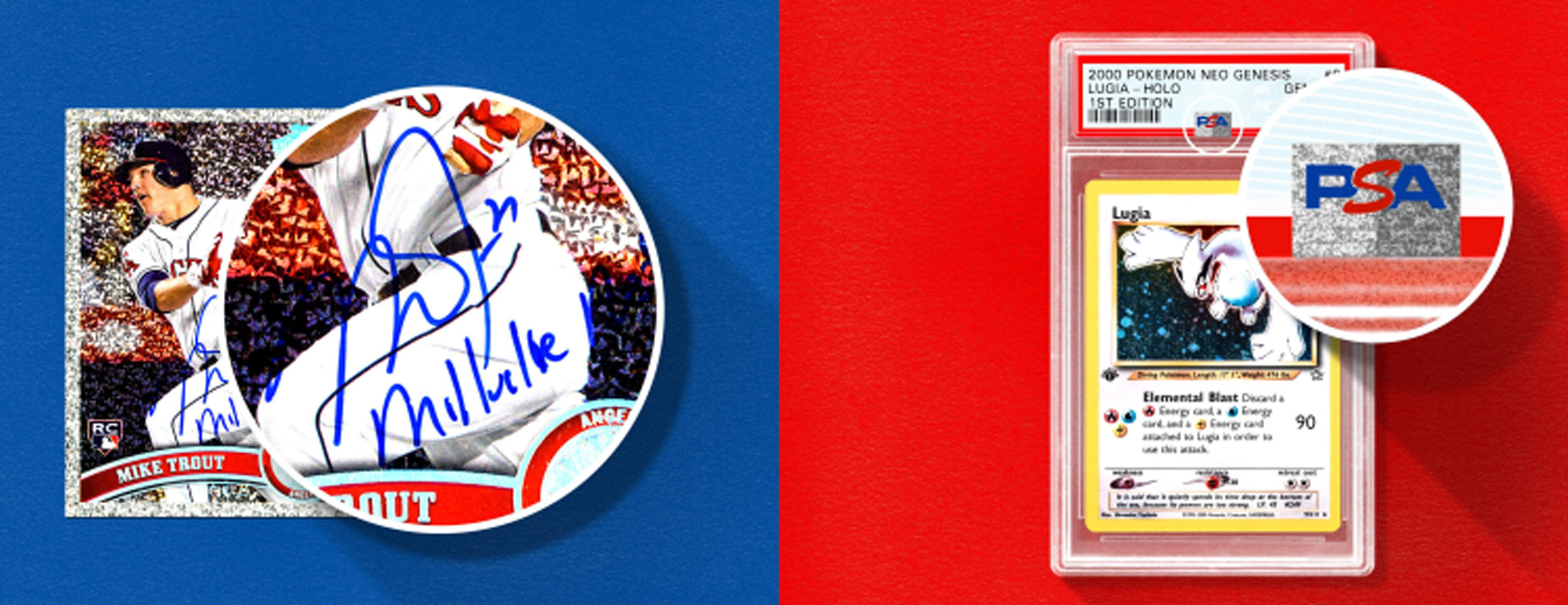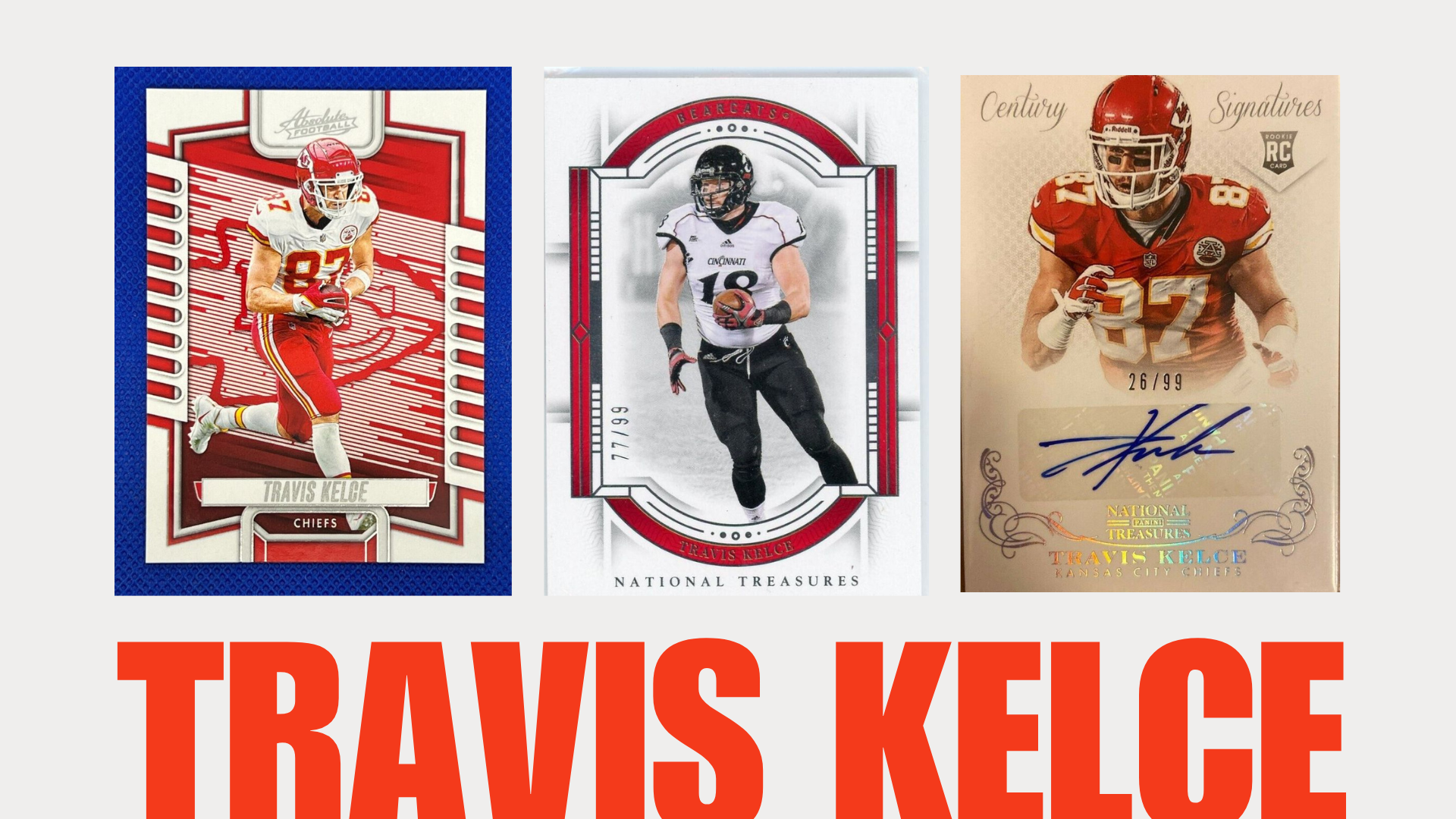From Rookie Cards to Hall of Fame: A Deep Dive into the Importance of PSA Card Grading
In the world of trading cards, few things hold as much value and fascination as trading cards. Whether you’re an avid collector or just getting started, understanding the importance of card grading is essential. This article delves into the significance of PSA (Professional Sports Authenticator) card grading and why it has become synonymous with quality and authenticity.
PSA is the leading card grading company that meticulously evaluates a card’s condition and assigns it a grade on a scale from 1 to 10. With their thorough and objective evaluation process, PSA provides collectors and investors with confidence in the value and condition of their cards.
Through this deep dive, we will explore the impact of PSA card grading on the market, the factors that influence grading, and why it matters to both collectors and sellers alike. Whether you’re interested in the history of card grading or the potential financial implications, this article will equip you with the knowledge you need to navigate the world of trading cards with confidence.
Join us as we unlock the secrets behind the importance of PSA card grading and embark on a journey from rookie cards to the illustrious halls of fame.
The importance of PSA card grading for collectors

When it comes to collecting trading cards, PSA card grading plays a crucial role. The grade assigned by PSA provides collectors with an objective assessment of a card’s condition, ensuring that they are investing in authentic and high-quality pieces. This grading system acts as a trusted guide for collectors, especially when it comes to purchasing rare or valuable cards.
PSA’s reputation as the leading card grading company has made its graded cards highly sought after by collectors. The PSA label not only adds prestige but also increases the market value of a card. Collectors place significant importance on owning cards that have been authenticated and graded by a reputable company like PSA.
Furthermore, PSA card grading provides a standardized system that allows collectors to compare cards accurately. The assigned grades help collectors determine the relative rarity and desirability of a particular card. This information is invaluable when building a collection or making informed decisions about buying or selling cards.
In summary, PSA card grading is of paramount importance to collectors as it establishes trust, increases market value, and provides a standardized system for evaluating and comparing cards.
How PSA card grading works

PSA’s card grading process is meticulous and thorough, ensuring the highest level of accuracy and consistency. Here’s a breakdown of how PSA evaluates and grades trading cards:
1. Submission: Collectors submit their cards to PSA for grading. The cards are carefully packaged to prevent any damage during transit.
2. Receipt and Verification: Upon receiving the cards, PSA verifies the submission details to ensure accuracy. The cards are then securely stored until they are ready to be graded.
3. Authentication: PSA’s team of experts examines each card to verify its authenticity. They scrutinize various elements such as the printing quality, card stock, and specific characteristics unique to the card’s manufacturer and year of production.
4. Grading: PSA evaluates the card’s condition using a comprehensive set of criteria, including centering, corners, edges, surface, and overall presentation. Each component is assessed and assigned a grade on a scale of 1 to 10, with 10 being the highest.
5. Encapsulation: Once graded, the card is encapsulated within a tamper-evident PSA holder. This protective case not only preserves the card’s condition but also displays its grade and certification number.
6. Finalization: The graded card is carefully packaged and returned to the collector, along with a detailed grading report. This report provides insight into how each component of the card was evaluated and the reasoning behind the assigned grade.
The meticulous process followed by PSA ensures that collectors can trust the authenticity and condition of their graded cards, thereby safeguarding their investments and enhancing the overall value of their collections.
The benefits of PSA card grading
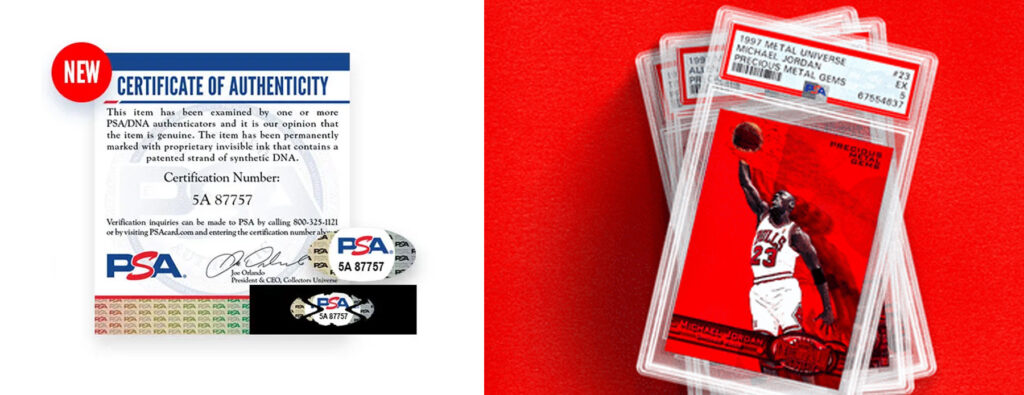
PSA card grading offers numerous benefits to collectors and sellers alike. Let’s explore some of the key advantages:
1. Authenticity: PSA’s authentication process guarantees that the card is genuine, eliminating concerns about counterfeit or altered cards. Collectors can confidently purchase graded cards, knowing they are investing in authentic pieces.
2. Condition Assessment: PSA’s grading system provides an objective and standardized assessment of a card’s condition. This allows collectors to accurately gauge the quality and value of a card, making informed decisions about buying or selling.
3. Market Value: PSA graded cards consistently command higher prices in the market compared to their ungraded counterparts. The PSA label adds credibility and desirability to a card, attracting collectors who are willing to pay a premium for graded cards.
4. Protection: The PSA holder not only safeguards the card from physical damage but also prevents tampering. The tamper-evident case ensures that the card’s condition remains intact, providing long-term protection for collectors.
5. Increased Demand: Graded cards are highly sought after by collectors, leading to increased demand in the market. This demand, coupled with the scarcity of high-grade cards, can result in significant price appreciation over time.
Overall, PSA card grading offers collectors and sellers a range of benefits, including authenticity, condition assessment, increased market value, protection, and increased demand.
The impact of PSA card grades on card value
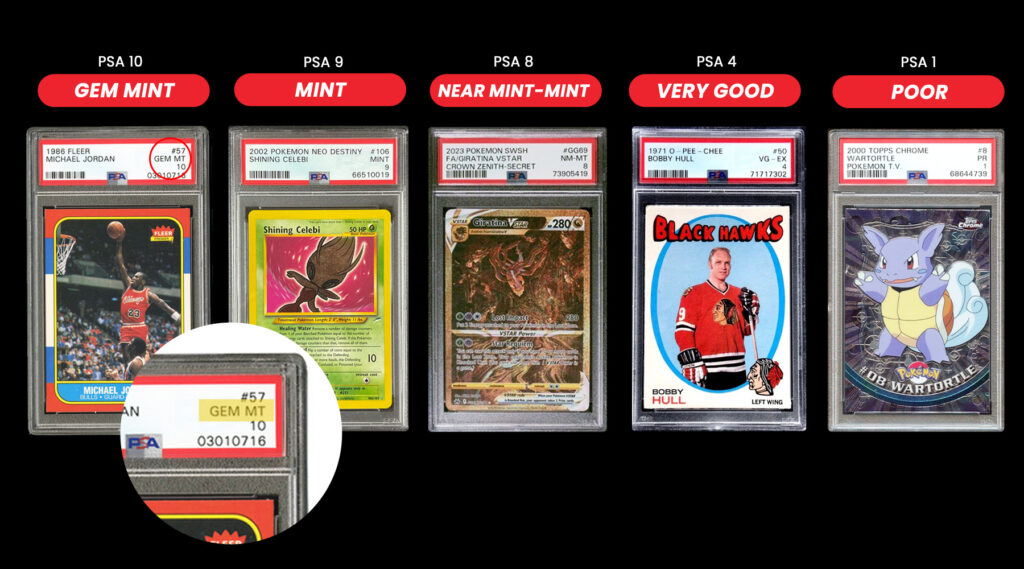
PSA card grades have a profound impact on the market value of trading cards. The assigned grade determines the card’s rarity, desirability, and ultimately, its price. Let’s explore how different PSA grades affect the value of a card:
1. Gem Mint (PSA 10): A Gem Mint PSA 10 grade represents the highest level of condition and perfection. Cards with this grade are exceptionally rare and command a premium price in the market. Collectors value PSA 10 cards for their pristine condition and consider them the epitome of quality.
2. Mint (PSA 9): Mint graded cards (PSA 9) are also highly desirable and attract premium prices. While they may have minor imperfections that prevent them from achieving the Gem Mint status, PSA 9 cards are still considered near-perfect and hold significant value.
3. Near Mint-Mint (PSA 8): Near Mint-Mint graded cards (PSA 8) exhibit minimal signs of wear and are in excellent condition. Although they may have slight imperfections, PSA 8 cards are still highly sought after by collectors and can command respectable prices.
4. Very Good (PSA 4): Very Good graded cards (PSA 4) have noticeable wear, but the overall appeal and eye appeal remain intact. While PSA 4 cards may not reach the premium prices of higher grades, they still hold value for collectors looking to own a piece of history.
5. Poor (PSA 1): Poor graded cards (PSA 1) have significant wear and may exhibit damage or heavy creasing. Despite their low grade, PSA 1 cards can still be valuable, especially if they feature iconic players or are from rare sets.
It’s important to note that the market value of a card is influenced by factors beyond just the PSA grade, such as player popularity, rarity, and historical significance. However, PSA grades serve as a key determinant of a card’s value, with higher grades commanding higher prices due to their scarcity and condition.
PSA card grading vs. other grading companies
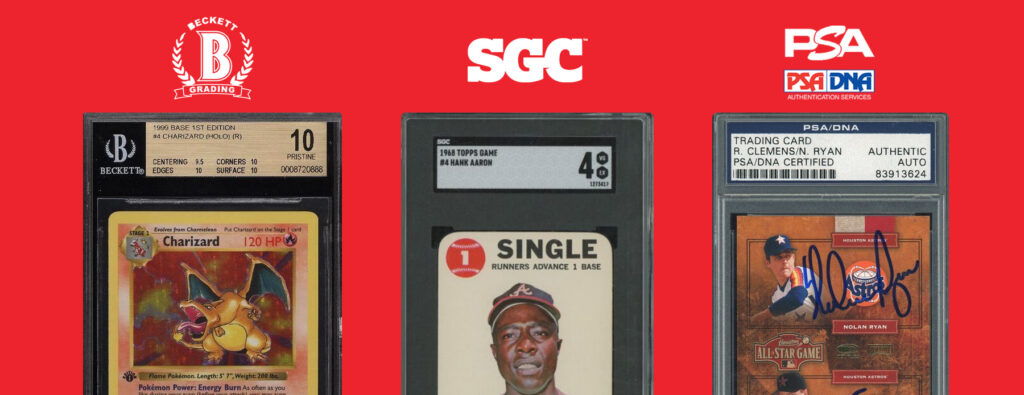
While PSA is the leading card grading company, there are other grading companies in the market as well. Let’s explore how PSA card grading compares to some of the other prominent grading companies:
1. Beckett Grading Services (BGS): BGS is another well-established grading company known for its meticulous grading process. BGS uses a 10-point scale to grade cards, similar to PSA. However, BGS also assigns a subgrade for each of the four components (centering, corners, edges, and surface) to provide a more detailed evaluation.
2. SGC (Sportscard Guaranty Corporation): SGC is a respected grading company that offers a slightly different grading scale. SGC uses a scale from 1 to 100 to assign grades, with 100 being the highest. SGC is known for its strict grading standards and has a loyal following among collectors.
3. PSA/DNA: PSA also offers card autograph authentication services through its PSA/DNA division. PSA/DNA is highly regarded for its expertise in authenticating autographs, ensuring that collectors can confidently purchase autographed cards with verified signatures.
While each grading company has its own merits, PSA’s dominance in the market and its reputation for accuracy and consistency make it the preferred choice for many collectors. PSA graded cards generally command higher prices and are more widely recognized and accepted within the collecting community.
Tips for submitting cards to PSA for grading

If you’re considering submitting cards to PSA for grading, here are some tips to ensure a smooth and successful process:
1. Research: Familiarize yourself with PSA’s grading standards and guidelines to understand what factors are considered during the evaluation process.
2. Card Preparation: Clean the cards thoroughly and handle them with care to avoid any damage. Remove any debris or fingerprints that may affect the card’s appearance.
3. Proper Packaging: Use high-quality card sleeves and top loaders to protect the cards during transit. Ensure the cards are securely packaged to prevent any movement or damage.
4. Submission Type: Choose the appropriate submission type based on the value and quantity of the cards you are submitting. PSA offers various submission tiers, including bulk, value, and express.
5. Insurance: Consider insuring your package when sending valuable cards to PSA. This provides additional protection in case of loss or damage during transit.
6. Tracking and Communication: Keep track of your submission by using the tracking number provided. Stay updated on any communication from PSA regarding the progress of your submission.
By following these tips, you can enhance the chances of a successful grading process and ensure that your cards receive fair and accurate evaluations from PSA.
Common misconceptions about PSA card grading

There are several misconceptions surrounding PSA card grading that are important to address:
1. All PSA Graded Cards are Perfect: While PSA graded cards are highly regarded, it’s important to remember that even Gem Mint (PSA 10) cards can have minor imperfections. Grading is subjective to a certain extent, and factors such as centering and print quality can vary.
2. Grading Guarantees Future Value Appreciation: While high-grade PSA cards often appreciate in value, market trends and other factors can influence the price fluctuations. Grading alone does not guarantee future value appreciation.
3. PSA Grading is Only for High-Value Cards: PSA grading is not limited to high-value cards. Collectors can submit cards of varying values to PSA, as grading provides authentication, condition assessment, and a standardized system for all cards.
4. Grading Always Increases the Card’s Value: While PSA grading generally increases a card’s value, there are exceptions. Lower-grade cards or cards from unpopular players/sets may not see a significant increase in value after grading.
It’s important for collectors to have realistic expectations and understand the nuances of card grading to make informed decisions about submitting cards to PSA for grading.
The future of PSA card grading
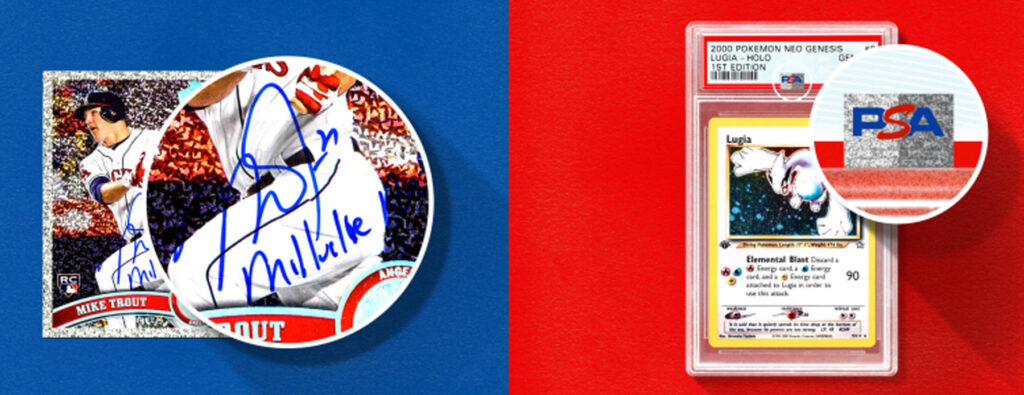
As the trading card market continues to grow and evolve, the future of PSA card grading remains promising. PSA’s reputation as the leading grading company, coupled with its extensive expertise and stringent evaluation process, positions it well for continued success.
Advancements in technology and authentication techniques may further enhance PSA’s ability to accurately assess and grade cards. Additionally, PSA’s expansion into other areas such as autograph authentication through PSA/DNA indicates a commitment to providing comprehensive services that cater to collectors’ needs.
As the demand for graded cards continues to rise, PSA’s role in establishing credibility and maintaining market standards will likely become even more crucial. The future of PSA card grading looks bright, and collectors can expect continued excellence and innovation from the industry’s leading grading company.
If you’re a collector, you understand the importance of displaying your prized possessions. To enhance your trading card experience, consider these three products that seamlessly integrate with your collection:
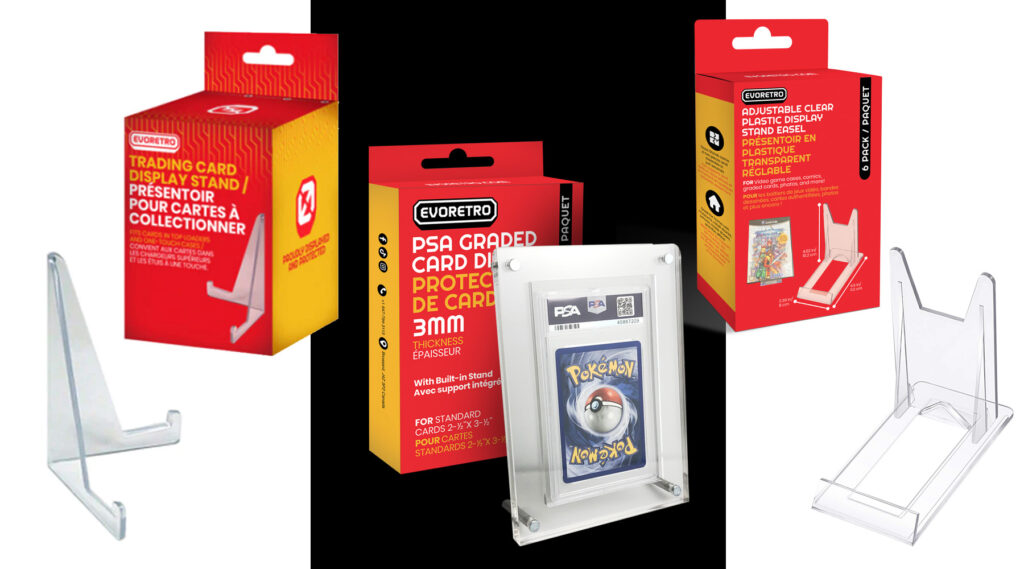
Adjustable Easel Stand Compatible with Video Game Cases:
- Perfect for showcasing your favorite video game-themed trading cards.
- Adjustable design accommodates various card sizes.
- Durable construction ensures long-lasting display.
Card Display Stand – 35-260PT Clear Durable Game Card Stand:
- Ideal for displaying cards within the 35-260pt range.
- Clear design provides an unobstructed view of your cards.
- Sturdy construction for secure and stylish presentation.
Pokemon Slab PSA Graded Card Stand Acrylic Protector:
- Specifically designed for PSA graded cards.
- Protects your valuable graded cards while showcasing them elegantly.
- Enhances the overall presentation of your PSA graded cards.
Conclusion

PSA card grading holds immense importance in the world of trading cards. From providing authentication and condition assessment to enhancing a card’s market value, PSA’s grading system has revolutionized the collecting landscape. Collectors and sellers alike rely on PSA’s expertise and reputation to navigate the market with confidence.
By understanding the significance of PSA card grading, collectors can make informed decisions about buying, selling, and building their collections. The objective evaluation process, standardized grading scale, and protective encapsulation offered by PSA ensure that collectors can trust the authenticity and quality of their graded cards.
From rookie cards to the illustrious halls of fame, PSA card grading has become an integral part of the trading card industry. As the market continues to thrive, PSA’s commitment to accuracy, consistency, and innovation solidifies its position as the go-to grading company for collectors worldwide. So, whether you’re a seasoned collector or just starting your journey, embrace the importance of PSA card grading and embark on a thrilling adventure through the world of trading cards.

